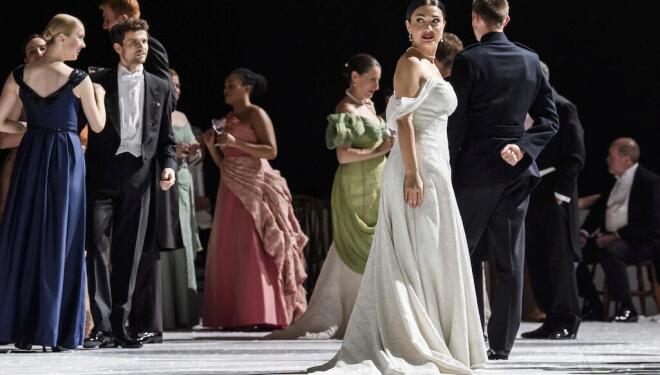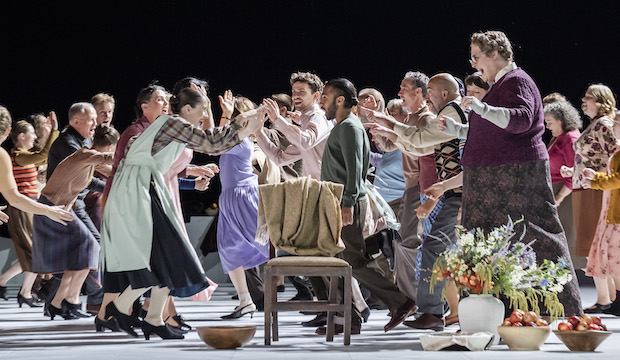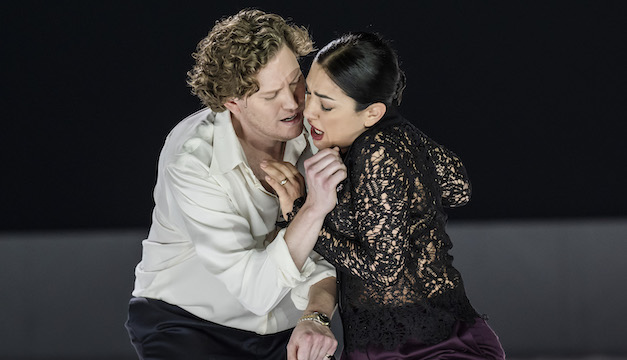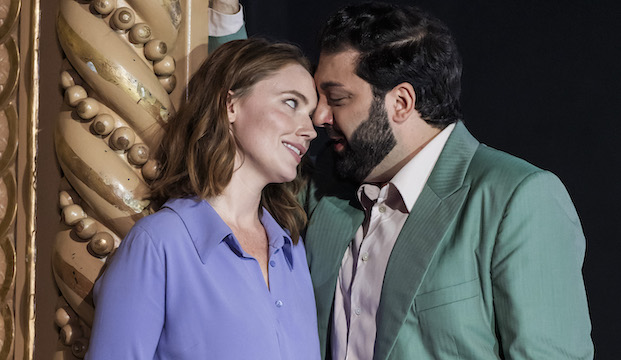
We know that the effortless heir Onegin has lofty ambitions: he does not disguise his disgust at having had to care for a frail uncle. Marriage to Tatyana amid the aprons, apples and wheat sheaves would not be enough. But in Ted Huffman's new production of Eugene Onegin for the Royal Opera, we do not get a sense of this claustrophobia. On designer Hyemi Shin's vast, bare stage there is room to spare, the chorus stretched out in lines leaving voids in which, says Hoffman, we visualise the world of our choice.
No garden, no bedroom, no party room, no ballroom, then. But quite a lot of chairs. 
Harvest celebrations in Eugene Onegin. Photo: Tristram Kenton
On the other hand, Huffman interestingly develops characters beyond the text, particularly sisters Tatyana and Olga, giving them other, younger siblings, and creating for Olga in particular a role in the letter scene and a future beyond the catastrophe on which the drama pivots and which, unusually, they witness.
Huffman moves the action from 1820s Russia to – well, where? Possibly, judging by Astrid Klein's hideous and drab costumes for the chorus, mid-century Soviet Russia. Or today's oligarchy, in designer gowns. On the way, the distinctive and class-linked character of the important and thrilling dances is lost in movement director Lucy Burge's messy choreography, beyond the high-octane stomp of the harvest hop.
The energetic cotillon of Tatyana's name-day celebrations is deconstructed, shoved upstage and masked by a giant cake. The polonaise belongs on Strictly.
Gordon Bintner as Onegin and Kristina Mkhitaryan as Tatyana. Photo: Tristram Kenton
Fortunately the singers, having to work very hard in this unhelpful acoustic barn, create some wonderful moments. Russian soprano Kristina Mkhitaryan grows and grows as Tatyana, her journey from coltish ingenue to princess measured in her bearing and voice. Like giddy sister Olga, sung by American contralto Avery Amereau, she is occasionally overpowered by the Orchestra of the Royal Opera under Henrik Nánási, but both women enter into their family roles with energy and grace.
Outstanding performance of the night comes from Armenian tenor Liparit Avetisyan, a saddened and exasperated Lensky, engaged to flirtatious Olga, and betrayed by Onegin, his neighbour and friend. When the two men face each other in a duel, Huffman makes an audacious change to Pushkin's storyline, surprising even those who know the opera well. Newcomers to the piece will have gone away simply misled.
Tall and rangy, Canadian baritone Gordon Bintner very much looking the part of Onegin, struggled a bit vocally on first night, but is a natural fit for this role.
Avery Amereau as Olga and Liparit Avetisyan as Lensky. Photo: Tristram Kenton
The noble warrior prince Gremin was sung on opening night by bass Brindley Sherratt, standing in for an indisposed Dmitry Belosselskiy. Another Gremin in the making, perhaps, is Jette Parker artist Jamie Wollard, impressive as Zaretsky, overseeing the duel.
Overwhelming as the orchestra occasionally was, the colourful and characterful playing of the woodwind in particular raised the pulse where the stagecraft dulled it. The players' full-bodied performance of this ravishing score found the joy and exhilaration in this layered story, as well as the misery.
Eugene Onegin is sung in Russian with English surtitles. Further performances are on 26, 30 Sept, 2, 4, 7, 10, 14 Oct. Click here to book
| What | Eugene Onegin, Royal Opera House review |
| Where | Royal Opera House, Bow Street, Covent Garden, London, WC2E 9DD | MAP |
| Nearest tube | Covent Garden (underground) |
| When |
24 Sep 24 – 14 Oct 24, Eight performances. Start times vary; run time 3hr 10min, including one interval |
| Price | £13-£270 |
| Website | https://www.rbo.org.uk/tickets-and-events/eugene-onegin-details |
